Harlem Chamber Players – Artist Profile
Six Questions for Liz Player of The Harlem Chamber Players
As Five Boroughs Music Festival skips around NYC, one element of the city’s cultural landscape that stands out to us are the city’s many neighborhood- and borough-based ensembles, groups like the Bronx Arts Ensemble, Washington Heights Chamber Orchestra, Jackson Heights Orchestra, and The Harlem Chamber Players. These are groups that mostly operate outside the city’s most formal concert spaces in the lower third of Manhattan, opting instead to directly serve a specific community.
Attending a concert by the Harlem Chamber Players gives a special feeling, the music-making always superb and the atmosphere relaxed, audience members, Chamber Players staff, and musicians all chit-chatting before and after. Over the last 14 years, and even during the challenges of the last two, they have steadily grown and served a loyal following. We wanted to know more about what makes them tick, and so sent some questions to Liz Player, The Harlem Chamber Players’ Founder, Executive and Artistic Director.
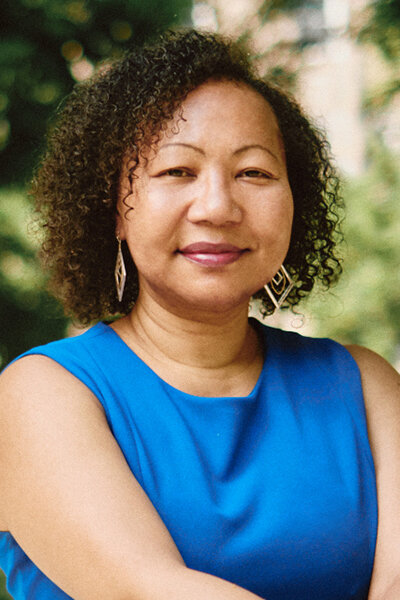
As a neighborhood-based arts organization within NYC, what does The Harlem Chamber Players provide that the more central arts organizations can’t?
I don’t know if we do anything that is especially unique. We have been in existence in Harlem for about 14 years now. When we first started, I felt timid about trying to bring a classical music group to Harlem, a community already rich with culture. However, throughout the years, we have established numerous partnerships with other Harlem arts organizations: the Harlem School of the Arts, Opus 118, Harlem School of Music, the Schomburg Center for Research in Black Culture, Harlem Stage, Harlem Historic Parks, Harlem Opera Theater, Dance Theatre of Harlem, and the Classical Theatre of Harlem, among others. We are always looking for new ways to partner with somebody.
What is your superpower?
My superpower is that I am good at organizing and bringing people together. I love people of all kinds and I love bringing different communities together, which is why I decided to call us a multi-ethnic collective. That could also be because my parents were so different from each other: my mother is Korean, small, and feisty, while my father was Black, a bit heavyset, and quite reserved.
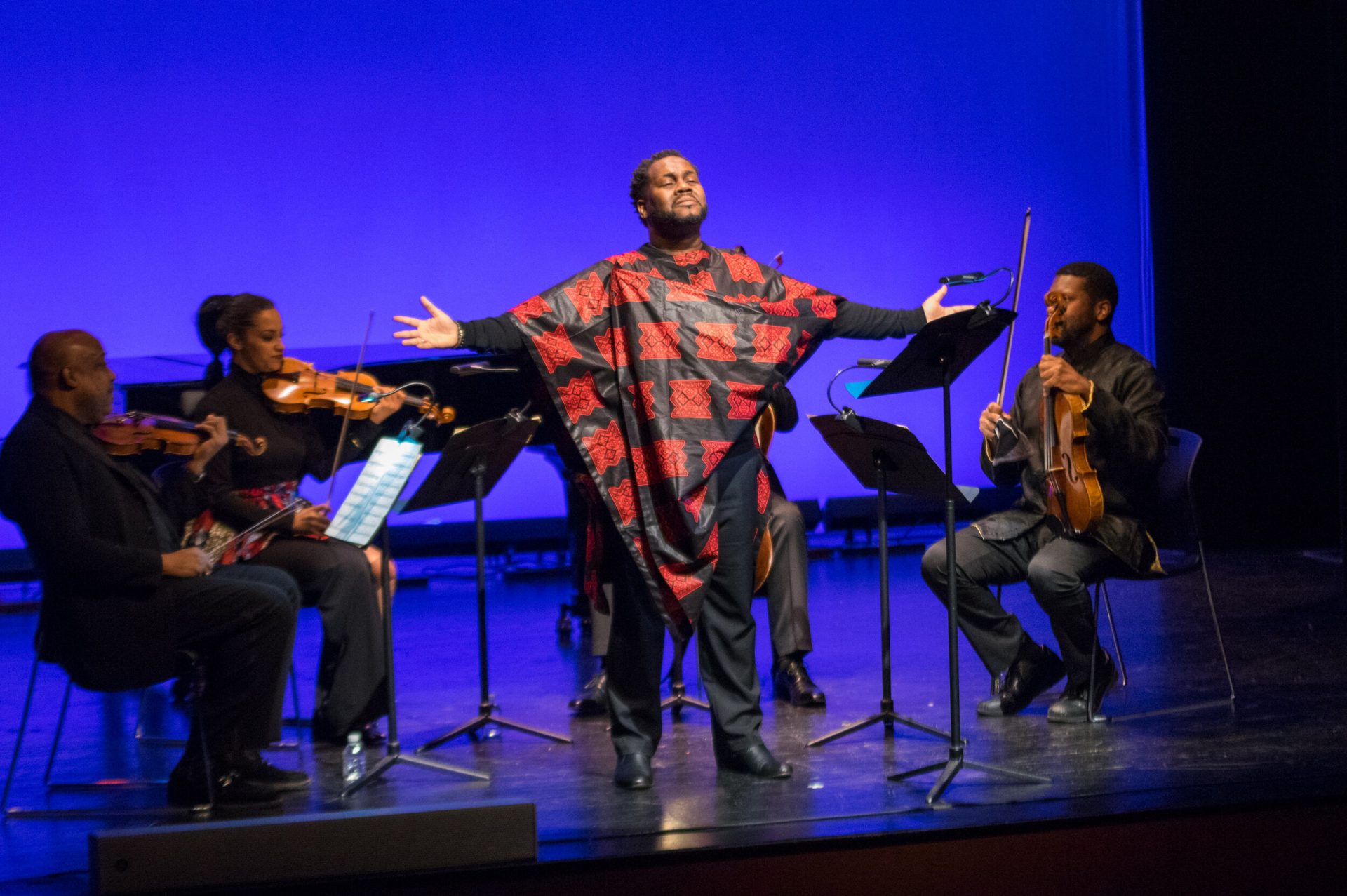
Baritone Kenneth Overton, violinists Ashley Horne and Jessica McJunkins, violist Amadi Azikiwe, and cellist Wayne Smith perform Adolphus Hailstork’s “Nobody Know.”
How has HCP adapted to the challenges of the last two years?
Prior to the pandemic, we really did not bother with creating videos or putting any of our performances online. We believed in live performances, that there is nothing that can replace the experience of being there in person enjoying the art first hand.
When the pandemic struck, we had almost nothing online. We had no choice but to make a hard pivot, and we immediately searched through our archives to find any videos we had worth posting to YouTube. We sent out an email we called “Pandemic Busters” with three of our favorite videos: a performance of the Bach Triple Violin Concerto, our world premiere performance of Adolphus Hailstork’s “Nobody Know,” and a performance of the first movement of George Walker’s String Quartet No. 1. Next thing I knew, I heard from Seth Colter Walls of the New York Times, he interviewed me for a story about how mid-sized ensembles were faring through the pandemic. I was honest and told him I was devastated, but links to those videos were then included in two different New York Times articles.
Then, Yolanda Wyns from Harlem School of the Arts reached out because she wanted us to put together an online masterclass. I did not feel up to it, but Yolanda was so energetic and pushed us to get it together. Somehow, her energy inspired me, and we took off from there, trying to think of all kinds of creative ways to explore the online world. I reached out to my colleagues. Terrance McKnight of WQXR, who also acts as our Artistic Advisor, and his wife Dr. Ashley Jackson had a great idea, which became our Harlem Walking Tour video series. I remember when Terrance pitched this to me. He suggested creating short videos (5-7 minutes long) that would feature various artists connected to Harlem. Each video would start with a short talk about a historical figure and would conclude with a short performance. We wound up creating seven episodes in all between December 2020 and March 2022 featuring Margaret Bonds, Coleridge-Taylor Perkinson, Duke Ellington, the Negro String Quartet, Dorothy Maynor, W.C. Handy, and Arthur Mitchell.
We were also very fortunate to have the opportunity to partner with Andrew Ousley of the Death of Classical series early on in the pandemic. He is incredibly creative, and we partnered with him on his “To America” program, which was broadcast by The Greene Space at WQXR and WNYC.
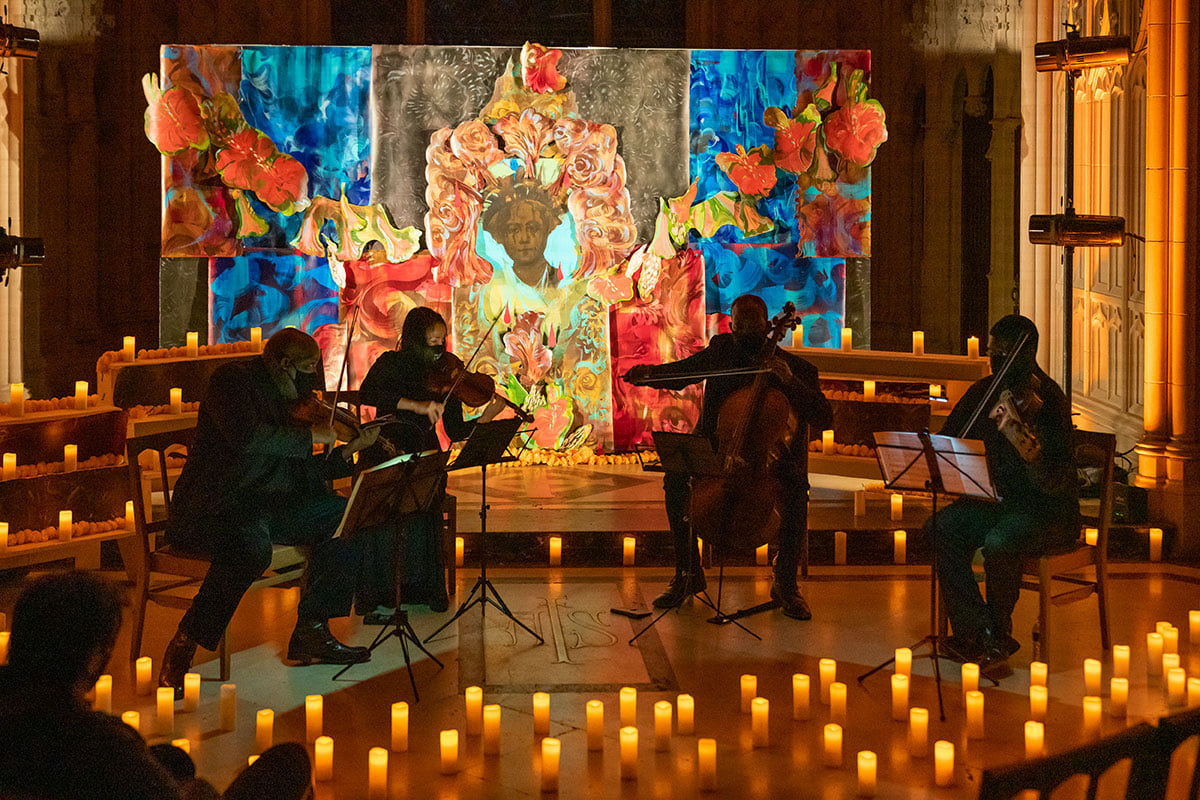
Ashley Horne, Claire Chan, Amadi Azikiwe, and Wayne Smith perform “To America.”
What recent projects are you most proud of?
I am really proud of the way our Juneteenth 2021 program in commemoration of the 100th anniversary of the Tulsa Race Massacre turned out, which I cannot really take credit for. I had reached out to Adolphus Hailstork, who is by now one of our favorite composers and a close friend of The Harlem Chamber Players. I asked him to write us another piece and he wrote TULSA 1921 for mezzo-soprano and chamber orchestra. J’Nai Bridges was the featured mezzo-soprano. The entire concert was named Pity These Ashes: TULSA 1921-2021.
We had to postpone the concert because of the surge of Covid cases in New York at the time. That turned out to be a blessing in disguise. We were able to raise a bit more money and The Greene Space entered into a partnership with us, Harlem Stage, and Harlem School of the Arts. We had no idea that Juneteenth would become a federal holiday, and that there would be so much attention around the history of Tulsa and what happened there. As a result, our online concert was mentioned, featured, and reviewed in numerous media, including CNN, Musical America, “Here and Now” on ABC, the New York Times, Ebony, and even on local Tulsa 2 News Oklahoma.
What I loved most about this concert was that we had a mix of Black, White, Asian, and Latinx musicians working on the project. The music was challenging, but I could see how seriously everyone took it and how hard everyone worked to make this a special event. It really warmed my heart to see us working together, people of different races and backgrounds, especially during these times that are so polarizing.
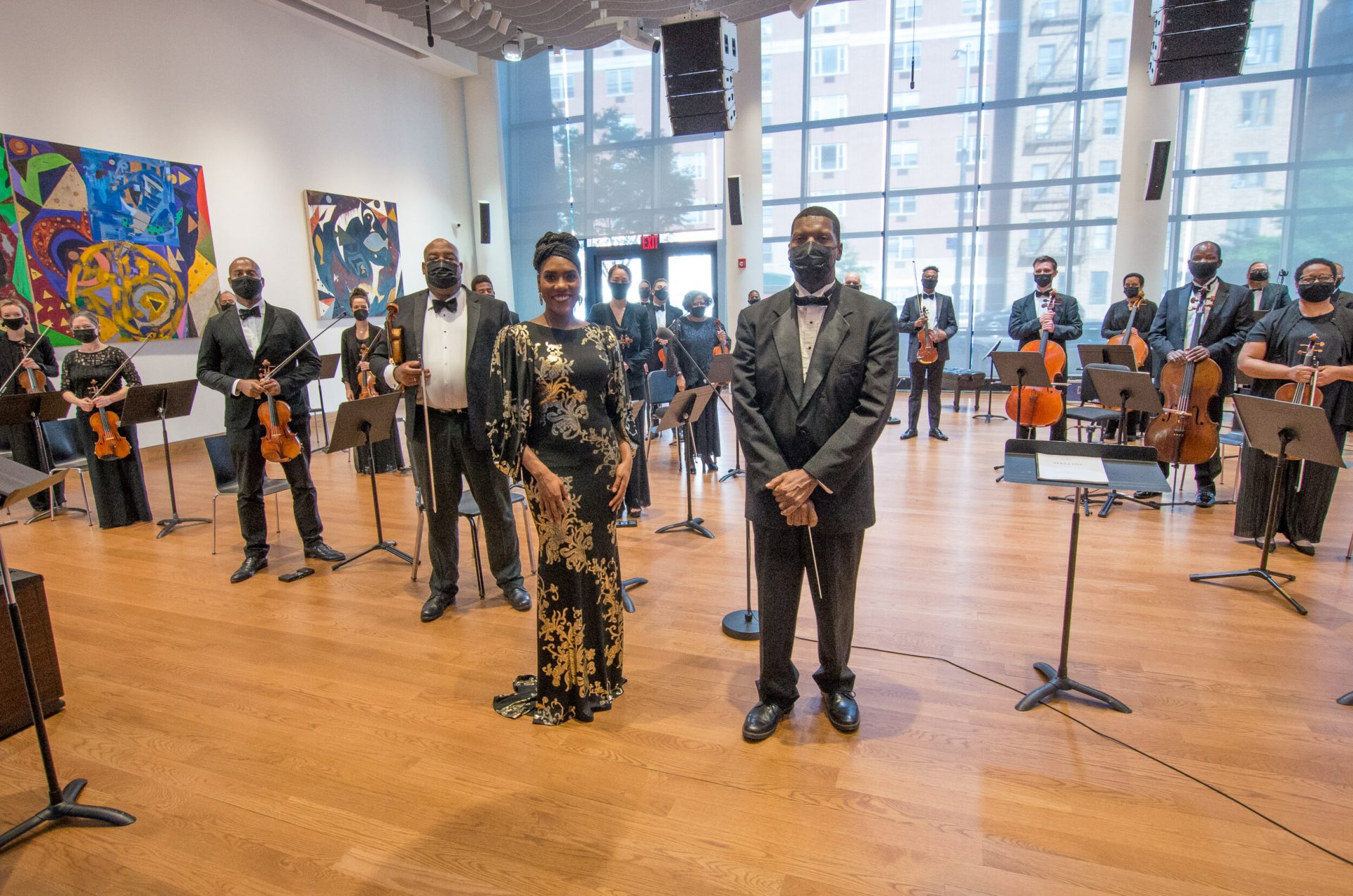
The Harlem Chamber Players in “Pity These Ashes: TULSA 1921–2021”
What upcoming projects or ventures are you most excited about?
I am most excited about finally being able to present the Harlem Renaissance composer Nathaniel Dett’s The Ordering of Moses after having to postpone this production for two years. I knew we had to do this piece when I joined the Harlem Cultural Collaborative, which was planning a Harlem-wide multi-year celebration of the Harlem Renaissance Centennial. With over 100 performers, this will be our biggest, most ambitious project to date, and it took a lot of hustling to find funds for this, so naturally I was devastated when the pandemic struck and we had to halt this production. Now, two years later, the story of Moses leading the Israelites out of Egypt after a series of plagues will have much more meaning.
This is now happening on Friday, June 17 at 7:30 PM at The Riverside Church with Damien Sneed as the music director and conductor. This production also features 5 Met Opera soloists, a 75-member choir, a 60+ piece orchestra with organ, PLUS a surprise performance.
We also have a new album coming out, hopefully this summer — all music by Adolpus Hailstork. I think that’s going to be a really good one!
What has been the secret to your success?
I would say what just about everyone else who has been successful says – it’s a combination of hard work and good fortune. And being thankful all the time for so many people who inspire me or open doors, especially my partner Carl Jackson, who likes to stay in the background. Not many people know that he’s the one who helped us get our first grants, who named our group The Harlem Chamber Players, and whom I consult every single day about plans for THCP. But there are many people who help, like Ashley Horne, who always dreamed of having a quartet. This quartet LOVES to rehearse, even before we were able to pay them adequately, and it shows in their performances. Because they were sounding good, we started getting more grants. Then, there’s Andrew Sotomayor, who is an incredibly talented music director, who started working with us during the pandemic. He has his own career, but he also likes working with us, and we are really lucky to have him with us. I’m rambling here, I guess I really don’t know how to answer this question. There is definitely a lot of luck in play!
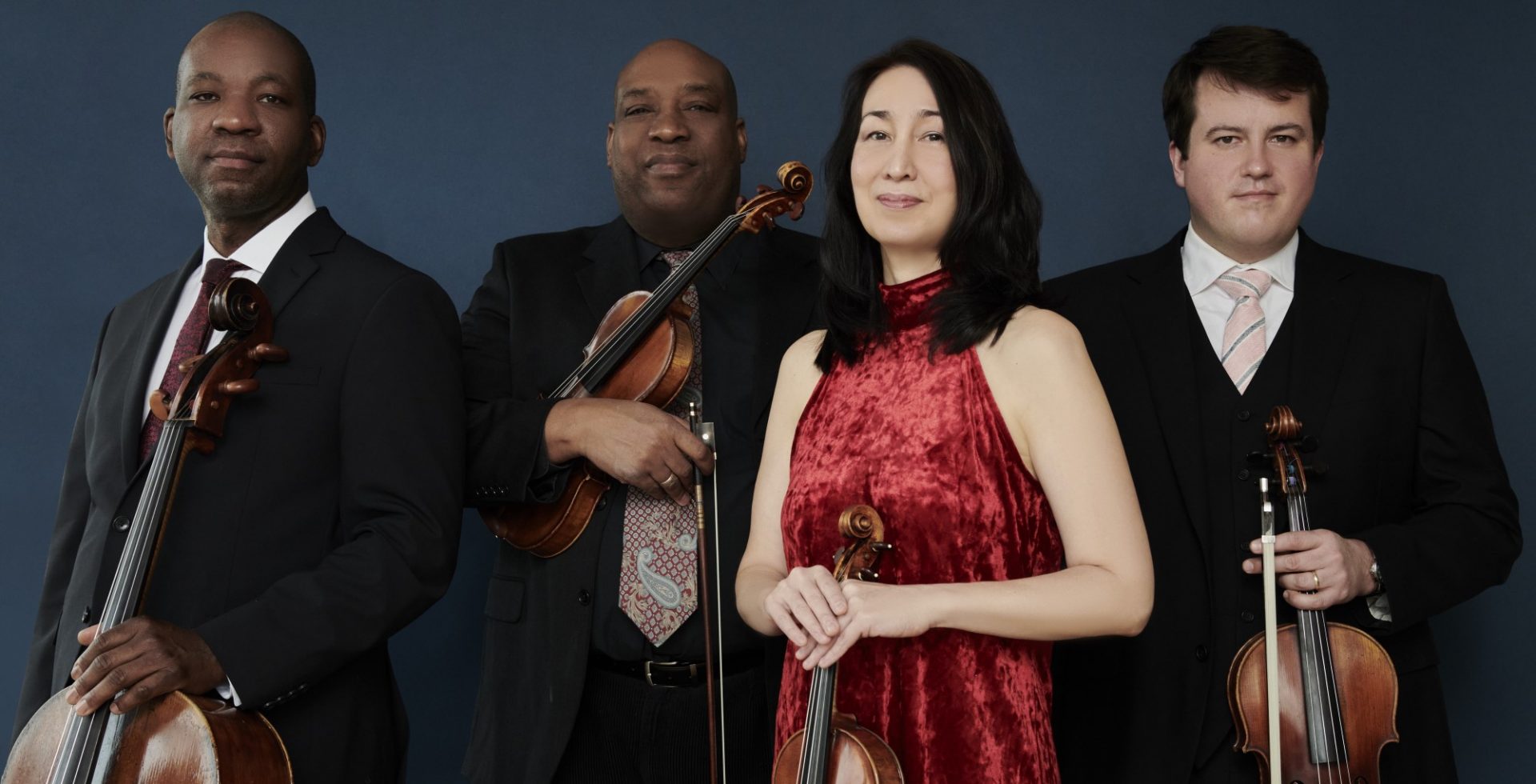
The Harlem Chamber Players String Quartet: (from left to right) Wayne Smith, Ashley Horne, Claire Chan, and William Frampton.
Get your tickets for the Harlem Chamber Players, in Manhattan on Friday, June 3 at 7:00 PM and in the Bronx Saturday, June 4 at 3:00 PM